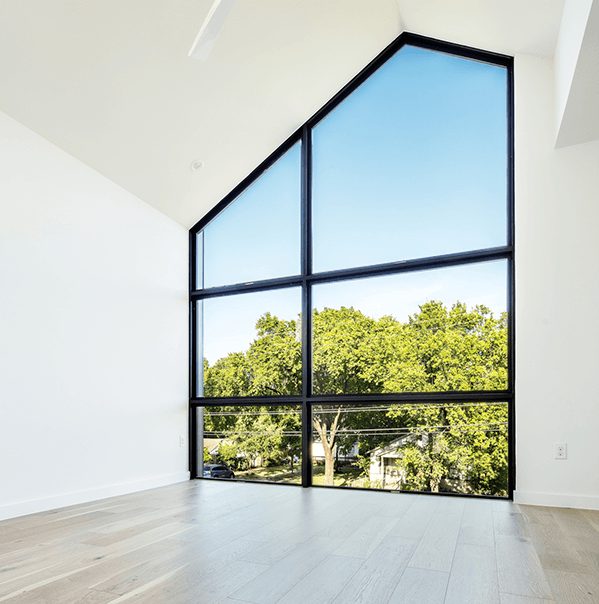Aluminum windows have become increasingly popular due to their numerous benefits. This comprehensive guide will explore everything you need to know about aluminum windows, including their history, advantages, potential drawbacks, comparisons to other window types, and maintenance tips. Whether you are considering aluminum windows for your new home or looking to replace your existing ones, this guide will provide valuable insights to help you make an informed decision.
Understanding Aluminum Windows
What are Aluminum Windows?
Aluminum windows are window frames made from lightweight and durable aluminum. The frames consist of extruded aluminum sections that are connected by corner joints. These frames can be customized to fit various window sizes and shapes, making them suitable for residential and commercial buildings.
Aluminum windows offer numerous advantages over other types of windows. Firstly, aluminum is highly resistant to corrosion, making it an excellent choice for locations with high humidity or coastal areas where saltwater exposure is common. Additionally, aluminum is a strong material that can withstand extreme weather conditions, ensuring the longevity of the windows. Moreover, aluminum windows are low maintenance and do not require regular painting or staining like wooden windows.
The History of Aluminum Windows
The use of aluminum in windows can be traced back to the 1950s, when it started to gain popularity due to its strength and corrosion resistance. Initially, aluminum windows were primarily used in commercial buildings. However, advancements in technology and manufacturing techniques have made aluminum windows more accessible and affordable for residential use as well.
Over the years, the design and functionality of aluminum windows have evolved. In the early days, aluminum window frames were often single-pane and lacked insulation, which made them less energy efficient compared to other types of windows. However, with advancements in glass technology, double-pane and even triple-pane aluminum windows are now available, providing better insulation and soundproofing.
Moreover, the aesthetics of aluminum windows have also improved significantly. In the past, aluminum frames were limited to a few standard colors, such as silver or bronze. However, modern aluminum windows can be powder-coated in a wide range of colors, allowing for greater customization and integration with the overall design of the building.
Additionally, manufacturers have introduced various design options for aluminum windows, including different frame profiles, hardware styles, and glazing options. This versatility allows architects and homeowners to create unique and visually appealing window designs that enhance the overall aesthetics of the building.
Furthermore, aluminum windows have become more environmentally friendly over time. The aluminum used in window frames is often made from recycled materials, reducing the demand for new aluminum extraction. Additionally, aluminum is a highly recyclable material, which means that at the end of their lifespan, aluminum windows can be recycled and turned into new products, minimizing waste and reducing environmental impact.
The Benefits of Aluminum Windows
When choosing the right windows for your home, several factors must be considered. One option that stands out for its numerous advantages is aluminum windows. Not only are they durable and long-lasting, but they also offer energy efficiency and cost-effectiveness. Let’s take a closer look at these benefits:
Durability and Longevity
One of the significant advantages of aluminum windows is their durability. Aluminum is a sturdy material that withstands harsh weather conditions, including strong winds and heavy rains. This makes it an ideal choice for homes in areas prone to extreme weather events.
Unlike wood, aluminum is not susceptible to rotting, warping, or termite damage. This durability ensures that your windows will last for many years, reducing the need for frequent repairs or replacements. With aluminum windows, you can enjoy peace of mind knowing that your investment will stand the test of time.
Energy Efficiency
Aluminum windows can also contribute to energy efficiency in your home. Aluminum windows can effectively insulate your home, reducing heating and cooling costs when combined with energy-efficient glazing options, such as double or triple-pane glass and low-emissivity coatings.
Furthermore, aluminum frames can be thermally broken, meaning they have a non-conductive material insert that prevents heat transfer. This feature enhances their energy-saving properties by minimizing thermal bridging and improving overall insulation. You can create a more comfortable living environment by choosing aluminum windows while reducing your carbon footprint.
Cost-effectiveness
Compared to other window materials, aluminum windows offer excellent value for money. They are generally more affordable than wood or fiberglass windows, providing comparable durability and energy efficiency. This makes them a cost-effective choice for homeowners who want to enhance their home’s aesthetics without breaking the bank.
In addition to the lower initial cost, aluminum windows require minimal maintenance. Unlike wood, they do not require regular painting or sealing to maintain their appearance. This saves you money on upkeep and repairs in the long run, making aluminum windows an economical choice for budget-conscious homeowners.
Overall, aluminum windows offer a range of benefits that make them an attractive option for homeowners. Their durability, energy efficiency, and cost-effectiveness make them a wise investment for anyone looking to enhance their home’s functionality and aesthetics. Consider aluminum windows for your next home improvement project and enjoy the many advantages they offer.
Potential Drawbacks of Aluminum Windows
Thermal Conductivity Issues
One of the main concerns with aluminum windows is their thermal conductivity. Aluminum is a metal that readily conducts heat and cold, which can lead to heat loss during winter and heat gain during summer. However, this drawback can be mitigated by using thermal breaks and high-performance glazing, which significantly improve the thermal efficiency of aluminum windows.
Potential for Corrosion
Although aluminum is corrosion-resistant, it can still be susceptible to corrosion in certain conditions, especially in coastal areas with salty air or high levels of air pollution. However, modern manufacturing techniques, such as powder coating and anodizing, have greatly improved the corrosion resistance of aluminum windows, making them suitable for various environments.
Comparing Aluminum Windows to Other Window Types
Aluminum vs. Vinyl Windows
When comparing aluminum and vinyl windows, it’s important to consider factors such as durability, energy efficiency, and aesthetics. While vinyl windows are known for their low maintenance requirements and insulation properties, aluminum windows offer superior strength and durability. Additionally, aluminum windows can be powder-coated in various colors and finishes, allowing for greater design flexibility.
Aluminum vs. Wood Windows
Wood windows have a timeless beauty and natural warmth, but they require regular maintenance and are susceptible to rotting or warping. On the other hand, aluminum windows, although lacking the natural charm of wood, offer greater durability and require little maintenance. Ultimately, choosing aluminum and wood windows depends on your preferences and priorities.
Maintenance and Care for Aluminum Windows
Cleaning and Upkeep
To keep your aluminum windows looking their best, regular cleaning is essential. Simply use a mild detergent and water solution to wipe down the frames, avoiding abrasive cleaners or tools that may scratch the surface. Also, lubricating the windows’ moving parts, such as hinges and locks, can help ensure smooth operation.
Repairing Aluminum Windows
In case of minor damage, such as scratches or dents, aluminum windows can be repaired using specialized kits or by contacting a professional repair service. However, if extensive damage or structural issues are present, considering window replacement may be more cost-effective.
In conclusion, aluminum windows offer a range of benefits, including durability, energy efficiency, and cost-effectiveness, making them a viable option for residential and commercial buildings. While they may have thermal conductivity concerns and potential for corrosion, these can be mitigated with modern design and manufacturing techniques. When comparing aluminum windows to other window types, factors such as durability, energy efficiency, and maintenance requirements should be carefully considered. Following proper maintenance and care guidelines ensures that your aluminum windows remain in excellent condition for many years.


